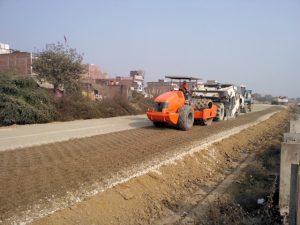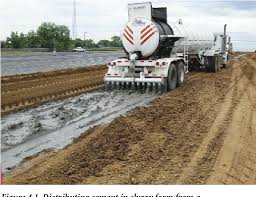Soil cement and its Types
A mixture of soil and measured amount of portland cement high density and compared to water.
It is a densely compacted mixture of Portland cement, soil or aggregate, other cementitious materials, and water. Soil cement is used primarily as a base material for pavements but also for slope protection, foundation stabilization, and other applications of low permeability liners.
Soil-cement is a simple highly compacted mixture of soil type, water, and portland cement. As the cement reacts/hydrates, the mixture gains and strengthens the engineering properties of the raw soil material. The major variables that control the characteristics of soil-cement mixtures and properties are the type of soil material and the proportion of cement in the mixture and the soil moisture conditions and the degree of compaction of the soil.
They are possible to simply by varying the cement content to produce soil-cement that ranges from basic modification of the compacted soil to fully hardened(strong) soil-cement that is frost resistant, strong, and durable.
Types of soil-cement.
Soil cement base.
It contains a very high proportion of cement than modified cement soil.it is commonly used as a cheap pavement base for streets, parking lots, airports, roads, material handling areas, and other cheap areas.

Cement modified soil
It contains a relatively Portland cement of small proportion and less than in ordinary soil cement. cement modified soil improved mechanical properties such as lower plasticity, decreased volume change, increased bearing ratio, and shear strength.

Cement treated base
It is a mix of granular soil aggregates/aggregate material with water and Portland cement. cement treated base similar in use and performance to soil-cement base.

Acrylic copolymer
It is also called Rhino Snot.it is a water-soluble acrylic copolymer applied to sand or soil which penetrates and coats the surface. When dry it forms a waterproof and UV-resistant and solid bond that binds the soil together and reduces dust.it is used for the roads, trails, parking lots, and other heavy traffic areas.
Use of soil-cement
soil cement is an efficient economical way of rebuilding pavements.
Types of soil are used.
The soil material in soil-cement can be any combination of sand, silt, clay, gravel. Local granular materials, such as slag, limerick, scoria, and caliche. plus a wide variety of waste materials including cinders, foundry sands, screenings and fly ash from gravel pits and quarries can all be utilized as soil material. Old granular-base material roads with or without bituminous surfaces.
How is soil cement built?
Before construction starts simple laboratory tests establish the cement content material, compaction, and requirements water of the soil material to be used. During the construction of tests are made to see requirements are being met. Testing ensures that the mixture will have long-term durability and strength. Do not guesswork is involved.
Why use soil cement.
Failing granular base pavements material with or without their old bituminous mats and can be strengthened, reclaimed as soil-cement pavements material, and salvaged. soil cement an efficient and economical way of rebuilding pavements material. During approximately 90 percent material used is already in place, handling and hauling costs are cut to a minimum. Many granular materials and waste materials from gravel pits and quarries can also be used to make soil-cement material.
Soil cement basics.
- Full-depth reclamation.
Recycles of old asphalt or bituminous and underlying base gravel material to create a stronger and cement-stabilized base for new road construction.

- Cement treated base.
Fine and coarse Aggregate material or granular soils mixed with measured amounts of water hardens and portland cement after compaction and curing a durable paving material.
- Cement modified soil.
Amends undesirable properties of problem soils/substandard materials with a relatively small proportion of portland cement so cement modified soil is suitable for the construction.
We Love Cricket